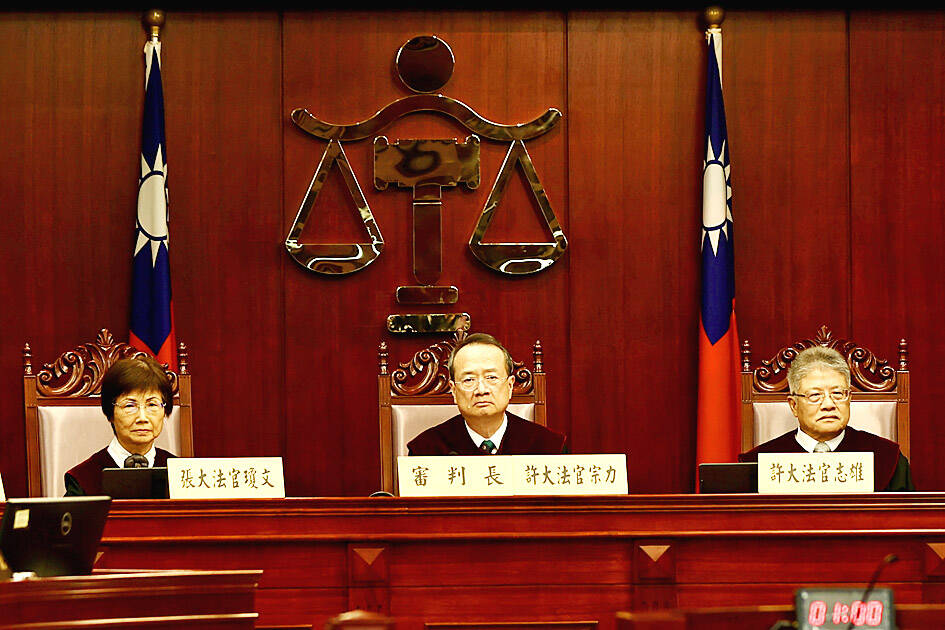The death penalty conforms with the Constitution, but should only be applied in “exceptional” cases, the Constitutional Court said yesterday.
The judgement was issued in response to a petition by prisoners on death row who said that capital punishment was unconstitutional.
“The death penalty is a capital punishment and its scope of application should still be limited to special and exceptional circumstances,” Chief Justice Hsu Tzong-li (許宗力) said during a lengthy readout of the court’s decision.

Photo: Ritchie B. Tongo, EPA-EFE
While the right to life is protected by the Constitution, “such protection is not absolute,” the court said in a statement.
“The court emphasized that because the death penalty is the most severe punishment and irreversible in nature, its application and procedural safeguards — from investigation to execution — should be reviewed under strict scrutiny,” it said in reference to the crime of murder.
However, “the judgement did not address the constitutionality of the death penalty in general or when imposed for other offenses,” such as treason or drug-related offenses, it said.
Imposing the death sentence is “prohibited” for “defendants with mental conditions, even if their mental conditions did not influence their offense in the cases in question,” the statement said.
Additionally, people on death row “should not be executed if they have a mental condition to an extent that impedes their competency for execution,” it said.
Democratic Progressive Party lawmakers yesterday affirmed the legality of capital punishment in the Criminal Code, adding that they would respect the court’s decision.
Chinese Nationalist Party (KMT) lawmakers criticized the ruling, saying “it effectively abolished capital punishment in Taiwan.”
The court’s decision runs contrary to the expectations of the majority of Taiwanese, they said.
Human rights advocates and groups opposed to capital punishment expressed disappointment with the Constitutional Court’s judgement, saying that government agencies had not pushed for a genuine decision on the issue.
“We shall keep up the fight. We hope that some day Taiwan will no longer have the death penalty,” they said in a statement.
“The Constitutional Court must be resolute in defending human rights by declaring the death penalty to be unconstitutional,” they said. “Then we can lead Taiwanese society forward to rise above hatred and using state violence as a deterrent.”
“It is time to break the cycle of taking lives and hatred to allow society to start the healing process,” the groups said. “It is unfortunate that the court did not do so.”
Taiwan Alliance to End the Death Penalty director Lin Hsin-yi (林欣怡) said that the government has not taken a firm stance on capital punishment because of divided public opinion on the issue.
However, DPP members are mainly in favor of abolishment, but they did not make an unequivocal statement to clarify their stance, Lin said.

CHAOS: Iranians took to the streets playing celebratory music after reports of Khamenei’s death on Saturday, while mourners also gathered in Tehran yesterday Iranian Supreme Leader Ayatollah Ali Khamenei was killed in a major attack on Iran launched by Israel and the US, throwing the future of the Islamic republic into doubt and raising the risk of regional instability. Iranian state television and the state-run IRNA news agency announced the 86-year-old’s death early yesterday. US President Donald Trump said it gave Iranians their “greatest chance” to “take back” their country. The announcements came after a joint US and Israeli aerial bombardment that targeted Iranian military and governmental sites. Trump said the “heavy and pinpoint bombing” would continue through the week or as long

TRUST: The KMT said it respected the US’ timing and considerations, and hoped it would continue to honor its commitments to helping Taiwan bolster its defenses and deterrence US President Donald Trump is delaying a multibillion-dollar arms sale to Taiwan to ensure his visit to Beijing is successful, a New York Times report said. The weapons sales package has stalled in the US Department of State, the report said, citing US officials it did not identify. The White House has told agencies not to push forward ahead of Trump’s meeting with Chinese President Xi Jinping (習近平), it said. The two last month held a phone call to discuss trade and geopolitical flashpoints ahead of the summit. Xi raised the Taiwan issue and urged the US to handle arms sales to

State-run CPC Corp, Taiwan (CPC, 台灣中油) yesterday said that it had confirmed on Saturday night with its liquefied natural gas (LNG) and crude oil suppliers that shipments are proceeding as scheduled and that domestic supplies remain unaffected. The CPC yesterday announced the gasoline and diesel prices will rise by NT$0.2 and NT$0.4 per liter, respectively, starting Monday, citing Middle East tensions and blizzards in the eastern United States. CPC also iterated it has been reducing the proportion of crude oil imports from the Middle East and diversifying its supply sources in the past few years in response to geopolitical risks, expanding

Pro-democracy media tycoon Jimmy Lai’s (黎智英) fraud conviction and prison sentence were yesterday overturned by a Hong Kong court, in a surprise legal decision that comes soon after Lai was jailed for 20 years on a separate national security charge. Judges Jeremy Poon (潘兆初), Anthea Pang (彭寶琴) and Derek Pang (彭偉昌) said in the judgement that they allowed the appeal from Lai, and another defendant in the case, to proceed, as a lower court judge had “erred.” “The Court of Appeal gave them leave to appeal against their conviction, allowed their appeals, quashed the convictions and set aside the sentences,” the judges